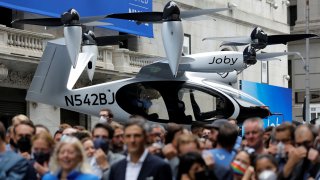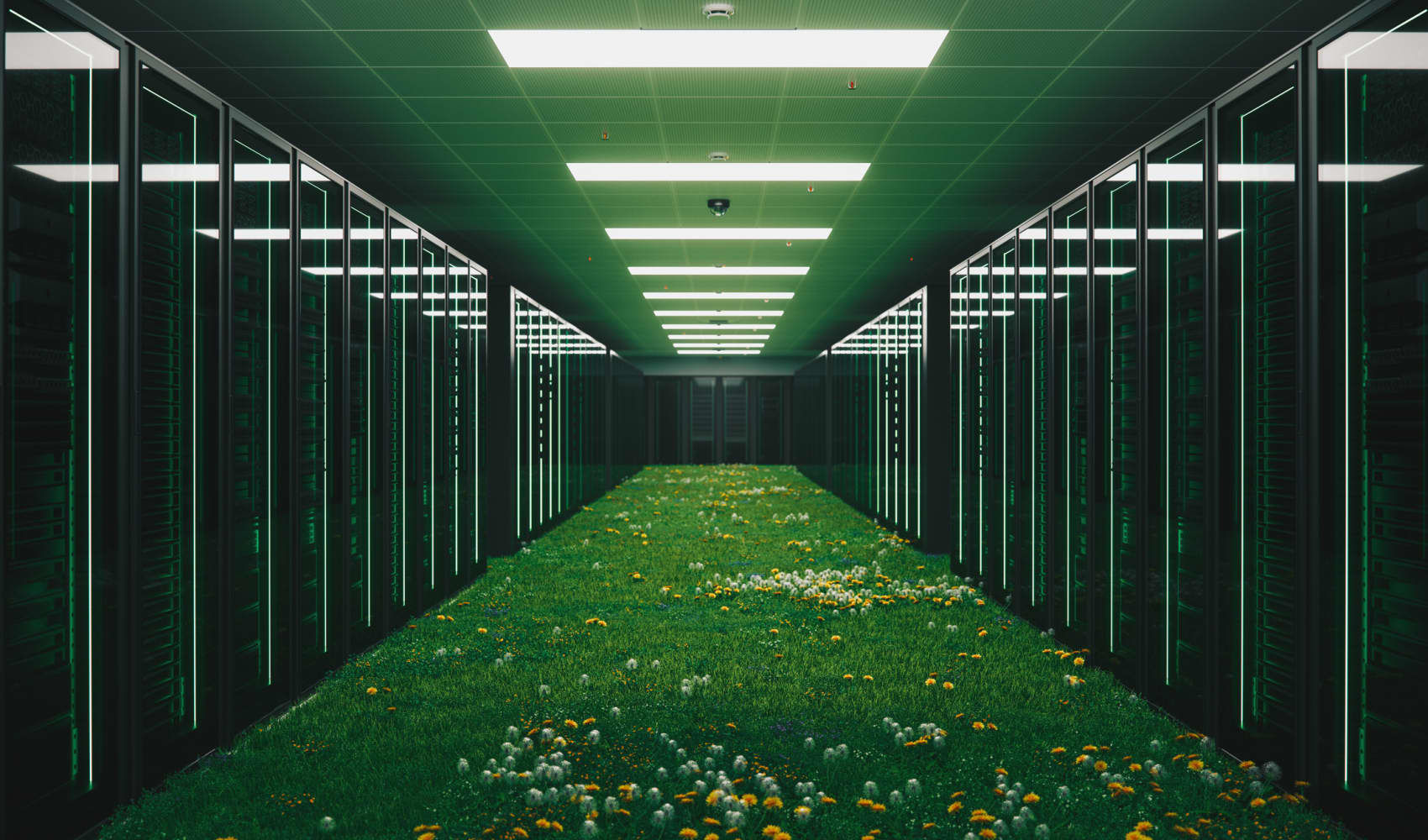
- Joby Aviation is developing electric vertical takeoff and landing aircraft (eVTOLs), and has told shareholders it will use them to offer an Uber-like "air taxi" service by the end of 2024.
- The company presented a rosy view of its production capacity and timeline to investors ahead of a SPAC deal last year. But it has filed plans for only modest production at a pilot facility with local regulators, according to public records first attained by short-biased hedge fund, Bleecker Street Capital.
- Bleecker Street Capital founder Chris Drose says there's no way the air taxi business can meet its projections. Joby says it's still looking for sites where it can produce a higher volume of its aircraft.
Joby Aviation, which is developing quiet, clean electric aircraft, has tantalized shareholders with plans to launch an Uber-like air taxi service into the market by 2024.
New research from Bleecker Street Capital, a short-biased hedge fund led by Chris Drose, claims that Joby presented an exceedingly optimistic view of its manufacturing capacity to investors, while making very modest production plans for its current factory, a pilot plant, in Marina, Calif.
Joby told CNBC it is now looking for the best site for a higher volume factory but declined to provide further details. It also provided a contrary report from analyst firm Raymond James that argued Joby's manufacturing plans are appropriate and the market understands the risks of the air taxi business already.
Feeling out of the loop? We'll catch you up on the Chicago news you need to know. Sign up for the weekly Chicago Catch-Up newsletter here.
Founded in 2009 by CEO JoeBen Bevirt, Joby is part of a movement to electrify aviation and reduce affiliated noise and air pollution while meeting growing demand for air travel.
In the U.S., civil aviation contributes about 3% of total carbon emissions each year, according to research from the Federal Aviation Administration. Besides exacerbating climate change with carbon emissions, the FAA writes, "aircraft operations have impacts on human health and welfare via noise pollution and emissions that degrade air quality."
Joby has developed an alternative to traditional planes or helicopters for short hops, known as an electric vertical take-off and landing aircraft, or eVTOL, in industry parlance. Joby's aircraft have a stated range of 150 miles, can travel up to 200 miles per hour, and have room to transport five people, including one pilot and four passengers.
Money Report
Joby boasts that it has conducted more than 1,000 successful test flights already, and was the "first eVTOL aircraft developer to receive a signed, stage 4 G-1 certification basis," which paves the way for the company's electric aircraft to become certified as airworthy and safe for commercial use.
The company's story and progress so far has netted it partnerships and deals with Uber, Toyota, the Department of Defense and others.
Joby's projections
Before the company went public via a SPAC deal with Reinvent Technology Partners in late 2021, Joby said in a pair of investor presentations that it was aiming to have 141 of its aircraft in operation, generating revenue, by the end of 2024.
Before it began trading on the NYSE, Joby forecast that it would have more than 900 eVTOLs in operation by the end of 2026, each one capable of delivering about 40 rides per day.
However, public records from Monterey County, Calif., first obtained by Bleecker Street Capital, reveal that as of June 2022, Joby was telling local officials it only plans to produce 10 eVTOLs per year in the next two years at its pilot plant in Marina.
The records also say that Joby plans to make just 30 air taxis per year, starting around 2027, at that facility, which is located at the Marina Municipal Airport Complex.
In 2020, local news reports citing environmental review documents said Joby planned to build a 580,000 square foot manufacturing facility at that same site. A spokesperson would not comment specifically on those plans. When presented with records and the reports, Joby said its "Pilot Production Plant" in Marina was always going to produce a low volume of eVTOLs and it's still trying to find the right location for a higher-volume "Phase 1" plant.
A Joby spokesperson wrote in an e-mail to CNBC on Thursday evening:
"Our approach to manufacturing has always included multiple phases, starting with initial, low volume production at our Pilot Production Plant located in Marina, CA, followed by a Phase 1 manufacturing facility that would support higher production volume of aircraft. We continue to actively pursue site selection for Phase 1 manufacturing across multiple locations. We remain pleased with the progress we are making on the Pilot Production Plant and aircraft certification, and were pleased to achieve our Part 135 Certificate ahead of schedule."
The spokesperson also noted, "We're actively evaluating proposals from a number of states, including California, regarding the potential location of our Phase 1 factory."
Bleecker Street Capital founder Chris Drose, who presented his short thesis on Joby at a Vision Research event in New York City on Thursday after markets closed, told CNBC that Joby "cannot possibly do what it says it's going to do." The shortseller thinks Joby should have already revised its guidance.
His short report also notes that Joby aims to deliver 40 flights per unit per day in 2026, with around 963 aircraft in operation by the end of that year.
"That translates into roughly 14 million flights per year. Last year, the FAA supervised 16.4 million flights in the U.S.," Drose wrote. "Joby's guidance is so aggressive that it implies a near doubling in the amount of aircraft taking off in the United States on a daily basis."
Raymond James & Associates wrote a note countering the Bleecker Street Capital short report Thursday night, arguing that the market already takes the risks of Joby's business into consideration. They also say that investors should not compare Joby's plans to those of traditional aviation businesses.
Bullish on Joby, Raymond James analysts said the company has an appropriate plan for manufacturing, having made some progress towards its goals already. They wrote, "Joby operates out of San Carlos, CA; Marina, CA; Washington D.C.; Europe; and Asia. We recently toured the parts production line at Joby's San Carlos, CA facility. We came away more impressed (or less skeptical) regarding the in-house manufacturing of many parts."
In October, Joby plans to hold a Field Day where analysts will be able to visit its Marina pilot plant.
Raymond James analysts also specified, "While Joby's 2021 investor deck bases unit economics on ~40 flights per day, our estimates are based on a slower ramp up to 25 flights per day starting in 2029."
Bleecker Street Capital's bet against Joby represents the largest position held by the upstart hedge fund today. Drose declined to say the exact size of his short position in the air taxi business. His firm, which launched in the fourth quarter of 2021, has about $35 million in assets under management.
Drose said he really hates traffic congestion, would love an electric air taxi option and to see climate-tech companies succeed. But he thinks that Joby is at risk of slowly falling apart as shareholders lose faith in the project due to inevitable production delays and pushed timelines.
The company's market cap hovered just over $2.5 billion as of market close Thursday, though the SPAC deal had valued Joby over $6 billion, and the company notched a post-transaction value around $4.5 billion in August last year. Shares were up slightly in Friday mid-day trading, but are down about 36% year-to-date.






